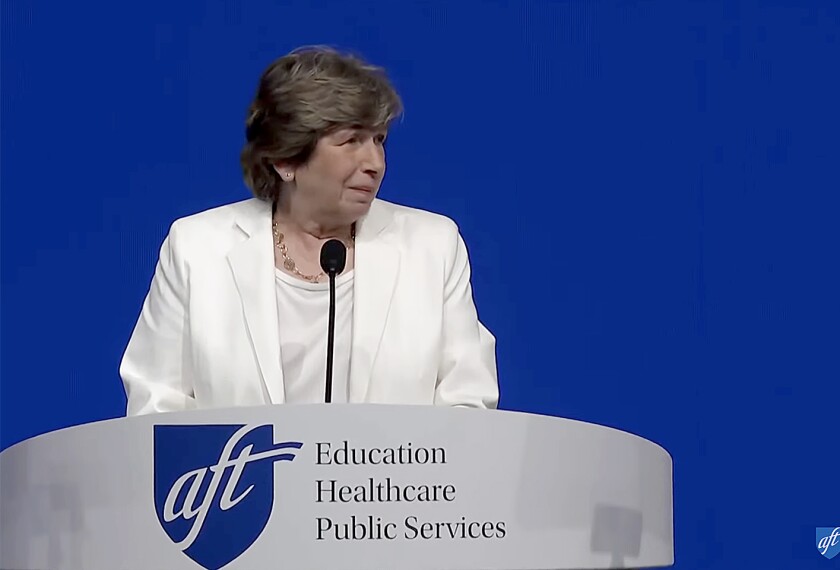A member of the Federal Communications Commission has offered a detailed and far-reaching case for overhauling the E-rate program to ensure online access for students and schools as demand for Web use rises.
In calling for creation of an “E-rate 2.0,” Commissioner Jessica Rosenworcel said the pressures put on school districts by the upcoming common-core online assessments, and an increasing emphasis overall on Web-based learning, are significantly straining districts’ online capacity.
Eighty percent of the schools and libraries in the United States report that their broadband connections do not meet their needs, she told attendees at an event arranged by the Consortium for School Networking, the International Society for Technology in Education, and the State Educational Technology Directors Association, in coordination with the Software and Information Industry Association’s Ed Tech Government Forum this month.
“Let’s be honest, those needs are only going to grow,” Ms. Rosenworcel said, according to an FCC-provided copy of her remarks. “School administrators are facing tough choices about limited bandwidth in the classroom. How to divvy it up, what grades and classrooms get it, and what programs they can run on it.”
Established by Congress in 1996, the E-rate is designed to ensure that all schools and libraries, particularly those in disadvantaged or rural communities, have communications services, including connections to the Internet. The program, which receives funding through fees collected from telecommunications providers, is administered by the FCC and managed by the nonprofit Universal Service Administrative Co.
Schools and libraries do not obtain aid directly from the program, but instead apply to receive discounts on the costs of services. Discounts vary, with greater amounts going to poorer applicants.
Demand for the program has created a need for more money to flow to schools, Ms. Rosenworcel told the industry group.
“E-rate 2.0 needs more funding,” she said. The program’s size was set 15 years ago, she noted: “That was when .03 percent of American households had Internet access.”
Changes Outlined
In her speech, Ms. Rosenworcel said the E-rate would prove crucial to cultivating students’ online and overall academic skills, and to keeping the United States competitive with other countries. She called for a number of changes that she said would benefit the program. They include:• Redirecting savings resulting from audits of another Universal Service-funded program, the Lifeline program—which provides discounts on monthly telephone service for impoverished individuals to connect to jobs, family, and 911 services—into the E-rate. Recent audits have saved, or are on track to save, hundreds of millions of dollars, Ms. Rosenworcel said.
• Setting clear “capacity goals” for schools seeking E-rate funds. Applicants should include information about capacity and needs, the commissioner said. By the 2015-16 school year, every school should have access to 100 megabits per 1,000 students; by the end of the decade, every school should have access to 1 gigabit per 1,000 students.
• Encouraging more public-private sector partnerships that would help build “cost-effective technologies, educational applications, and devices.”
• Creating a simpler process for E-rate applications. That should include allowing multiyear applications and those submitted by consortia, changes that would reduce administrative expenses, the commissioner said.
Heavy Reliance
For Ms. Rosenworcel’s proposals to take effect, they would need the approval of the full FCC.
Douglas Levin, the executive director of the State Educational Technology Directors Association, or SETDA, told Education Week that a reform of the E-rate program is “long past overdue.” His association has been a strong advocate for schools to establish “capacity goals” to understand how big the gap is between what they have and what they need. The changes outlined by Ms. Rosenworcel are responsive to those needs, and the FCC has broad authority to pursue all of these changes moving forward, he said.
“Without question, if there are not changes to the E-rate program, in some respects, it will collapse under its own weight,” said Mr. Levin. “There have been conversations and it has been abundantly clear that the E-rate program is under a lot of pressure and that there was need for it to evolve to meet new needs, in part because of its success. We were relying on these services more than people anticipated when it launched so many years ago.”
FCC recognition of the rising technology needs of schools was highlighted last week when the commission appointed Michael Steffen, who recently served as the legal adviser to the FCC chairman, to the newly created position of digital learning director.
“The new digital learning appointment is another good sign,” said Mr. Levin.





